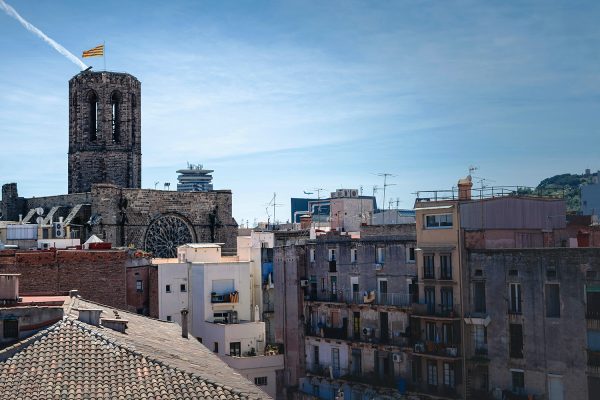
Spanish media widely reported this week that support for Catalan independence is down.
Most media have learned not to read too much into any one poll, and report averages or trends instead. Spain’s not so much.
I’m not surprised conservative newspapers like ABC and El Mundo would make hay out of the story. They have been trying to convince their readers Catalan independence is a fringe movement for many years. I am disappointed the center-left El País and Basque El Correo didn’t give their readers more context.
Fall in support
The poll in question, taken by Catalonia’s government-funded Center for Opinion Studies, is the most reliable of its kind. It is conducted three times per year, every time with more or less the same questions and a decent sample size. The headline figure for independence in its latest report — 39 percent — is the lowest in ten years.
Newspaper and university surveys have also found a decline in support for independence, but 39 percent is a new low.
I suspect there are two reasons:
- Support for independence peaked during the economic crisis of 2012-13, when Catalonia was forced by Spain to make spending cuts. Formerly pro-autonomy parties joined the separatists, but Spain refused to talk about devolution or allow a referendum on independence. The stalemate culminated in a referendum in 2017 that was forbidden by Spain’s highest court and boycotted by unionists. Spain suspended Catalan home rule and imprisoned those leaders of the regional government who did not flee abroad. The failure of the referendum to lead to a breakaway demotivated separatist voters.
- Immigration from other parts of Spain and other countries, and intermarriages between Catalans and other Spaniards, are causing the share of the population that identifies exclusively as Catalan — and is most likely to support independence — to shrink.
Still dissatisfied
That said, 50 percent of Catalans still feel the region has too little autonomy. Only 35 percent are satisfied with the status quo. 8 percent believe the region has too much control.
This is in stark contrast to other regions of Spain, where — with the exception of the Basque Country — majorities believe Catalonia has too much self-government.
72 percent of Catalans believe they ought to have a legal referendum on independence. Just 19 percent disagree. Again with the exception of the Basques, majorities of other Spaniards don’t believe Catalans should be allowed such a vote.
These figures do not suggest the Catalan problem is anywhere near being solved.
Majority for autonomy
What gives me hope is that the majority for (more) autonomy is growing.
I’ve argued for years, since I saw the repression of the 2017 referendum up close living in Barcelona, that the region needs a third way between secession and the status quo. Even when independence appeared to have majority support, it was barely over 50 percent; not a strong mandate to break away. At the same time, there wasn’t — and isn’t — a majority for keeping things as they are.
Ask Catalans if they want to leave Spain or not and only 39 percent say “yes”. But give them two more options — give up autonomy and become a state inside a federal Spain — and 54 percent would be content with either remaining an autonomous community or becoming a federal state.
New statute
Federalizing Spain would probably be a bridge too far even for the Spanish left. Giving Catalonia home rule was already controversial.
The Socialists negotiated autonomy with Catalonia in the early years of this century. The resulting autonomy statute was put to a vote. 78 percent of Catalans approved it.
But the statute was never fully implemented. Spanish conservatives, in opposition at the time, did not accept it and asked the Constitutional Court to overrule it. They were partly successful. The right-wing majority on the court revoked several articles of the statute and rewrote others. The ruling, in 2010, contributed to rising Catalan support for independence.
To his credit, Prime Minister Pedro Sánchez, who leads a coalition of left-wing parties, has said he is willing to devolve responsibility for health care, infrastructure, law enforcement and social security to Catalonia; areas where Catalan and Spanish competencies overlap. When they were in power, conservatives used that ambiguity to delay infrastructure investments in Catalonia and force the region to cut social security benefits in 2012, even though they were — and still are — funded by Catalan taxes.
Sánchez has balked at reforming Spain’s antiquated sedition law, under which Catalonia’s leading separatists were convicted in 2019. Two years into his four-year term, he has yet to meet more than once with Catalan leaders to hear out their ideas for more self-government.
Catalans have long demanded fiscal rights similar to the Basques, who collect their own taxes and send what they don’t need to Madrid. Catalonia only collects social-security tax. Corporate, income and sales tax are collected by the Spanish government, which sends a share back to Catalonia.
Control of health care, infrastructure, law enforcement and social security, fiscal autonomy, abolition of “sedition” as a crime (it no longer is in most European countries) and irrevocable home rule, so the suspension of 2017-18 can never be repeated, would probably be enough to satisfy most Catalans. Polls suggest they are ready to meet in the middle. Is Spain?
